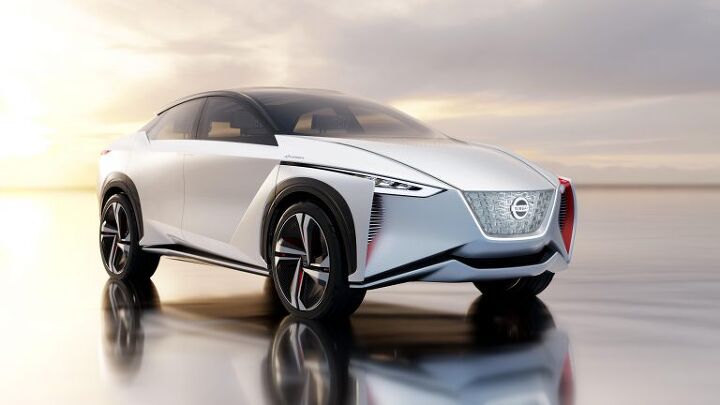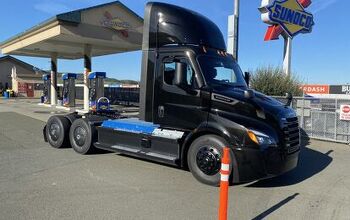Eight Is Enough: Nissan Leans on Familiar Future Strategy for Growth

Automakers perpetually talk about the future. They have to. As manufacturers, their entire business model revolves around bringing newer, better, and more desirable products to the market. Over the past few years, that has meant championing electric and autonomous vehicles — regardless of whether their consumer base (or the technology) is ready or not.
Nissan is no different in this regard, though it does appear to be taking a comparatively measured approach. Mercedes-Benz says it’ll have an electrified version of all of its models by 2022, Volvo promises to start doing the same by 2019, and Volkswagen Group wants 80 new electric vehicles across all of its brands by 2025. Meanwhile, Nissan is only shooting for eight new EVs by 2022.
That’s not to suggest the company won’t still blaze a trail for new powertrains, though. The strategy may just be a simple matter of not wanting to over-promise. As the company behind the the Leaf, Nissan is well aware of the benefits and pitfalls of a globally marketed electric car. However, its overall sales goal of 1 million electrified vehicles per year by 2022 remains ambitious and hinges on a market more eager for plug-in vehicles than it is today.
According to the automaker, the cornerstone of its “M.O.V.E. to 2022” midterm strategy will be new battery-electric vehicles and expanding the usage of its e-Power hybrid system. It also wants to get Infiniti models juiced up with electrons in 2021 and launch a major electric car offensive in China under various brands — which will be immensely important in ensuring EV delivery targets are met.
“Our product and technology strategy is dedicated to positioning Nissan to lead the automotive, technology and business evolution,” said Nissan’s chief planning officer Philippe Klein. “Our efforts are focused on delivering Nissan Intelligent Mobility, encompassing the three core elements of electrification, autonomous drive, connectivity and new mobility services.”
That means total internet connectivity on all vehicles wearing the Nissan, Infiniti, or Datsun badge by the early 2020s. The potential revenue streams for this are immense. Having an entire fleet of connected vehicles would allow an automaker to run a massive data mining side business. General Motors has already outlined its strategy for doing so and has begun partnering with businesses in preparation. But it’s not alone either; most major manufacturers are considering opening themselves up to data acquisition and in-car marketing opportunities over the next decade.
Connected cars also open up vehicles to app sales and help make automated driving hardware work more effectively. “The Alliance Connected Cloud will allow for all of the Alliance companies to integrate the data management of future, current and past connected vehicles – new models and those already on the road,” explained Ogi Redzic, senior vice president of Connected Vehicles and Mobility Services for the Renault–Nissan–Mitsubishi Alliance. “It will support infotainment services, as well as a single communication mechanism to facilitate updates over the air for all vehicles.”
Nissan also wants to cram the ProPilot safety suite into 20 models in 20 markets by 2022. While not true autonomy, it does get the company one step closer to that goal.
Getting back to those new cars, Japan’s number two automaker is pretty tight-lipped on physical products. It says it will build an electric “kei” mini-vehicle for Japan and an electric crossover, inspired by the Nissan IMx Concept, for the global market. Beyond that, the rest of its forthcoming EVs are unknown. However, it did admit that the future lineup won’t be entirely composed of plug-in hybrids. The brand definitively said the eight new models its talking about will be pure electrics that may offer e-Power variants.
[Image: Nissan]

A staunch consumer advocate tracking industry trends and regulation. Before joining TTAC, Matt spent a decade working for marketing and research firms based in NYC. Clients included several of the world’s largest automakers, global tire brands, and aftermarket part suppliers. Dissatisfied with the corporate world and resentful of having to wear suits everyday, he pivoted to writing about cars. Since then, that man has become an ardent supporter of the right-to-repair movement, been interviewed on the auto industry by national radio broadcasts, driven more rental cars than anyone ever should, participated in amateur rallying events, and received the requisite minimum training as sanctioned by the SCCA. Handy with a wrench, Matt grew up surrounded by Detroit auto workers and managed to get a pizza delivery job before he was legally eligible. He later found himself driving box trucks through Manhattan, guaranteeing future sympathy for actual truckers. He continues to conduct research pertaining to the automotive sector as an independent contractor and has since moved back to his native Michigan, closer to where the cars are born. A contrarian, Matt claims to prefer understeer — stating that front and all-wheel drive vehicles cater best to his driving style.
More by Matt Posky
Latest Car Reviews
Read moreLatest Product Reviews
Read moreRecent Comments
- V8fairy Not scared, but I would be reluctant to put my trust in it. The technology is just not quite there yet
- V8fairy Headlights that switch on/off with the ignition - similar to the requirement that Sweden has- lights must run any time the car is on.Definitely knobs and buttons, touchscreens should only be for navigation and phone mirroring and configuration of non essential items like stereo balance/ fade etc>Bagpipes for following too close.A following distance warning system - I'd be happy to see made mandatory. And bagpipes would be a good choice for this, so hard to put up with!ABS probably should be a mandatory requirementI personally would like to have blind spot monitoring, although should absolutely NOT be mandatory. Is there a blind spot monitoring kit that could be rerofitted to a 1980 Cadillac?
- IBx1 A manual transmission
- Bd2 All these inane posts (often referencing Hyundai, Kia) the past week are by "Anal" who has been using my handle, so just ignore them...
- 3-On-The-Tree I was disappointed that when I bought my 2002 Suzuki GSX1300R that the Europeans put a mandatory speed limiter on it from 197mph down to 186mph for the 2002 year U.S models.


































Comments
Join the conversation
Nissan is hedging itself, which I think is a good move. I currently believe EVs and electrically assisted vehicles can go two ways. There is way too much faith placed in EVs and EVs so far have proven themselves to be expensive vehicles. ICE still has a way to go in efficiency and this will always challenge the idea that EVs are the best and most economical alternative. Many city dwellers drive a small amount of miles per year in short trips. Many on this site believe this is ideal for owning an EV. But, when you look at it from a dollar and cents perspective buying a $12 000 small car is attractive if you live in the city. The price difference in fossil fuel/energy use between the EV and the ICE car will take years to pay back the difference. Remember EVs do cost to "fill up" and are more expensive to get into.
Nissan thinks they are developing a new profit center, but building a corporate spy grid is more likely to get their executives thrown in jail. Ask Facebook whether it's a good idea to mine data and sell it to the highest bidder. Imagine how much worse the situation would be if Facebook were charging people for the privilege of being spied on. These companies need to sober up. Regulation and public condemnation are more likely outcomes than operating a lucrative corporate spy grid.